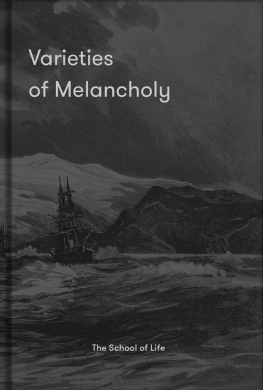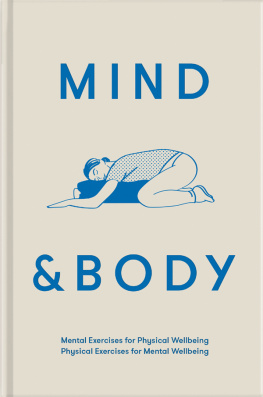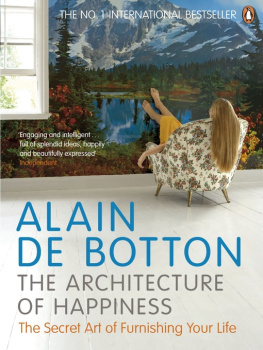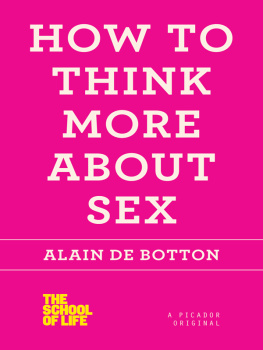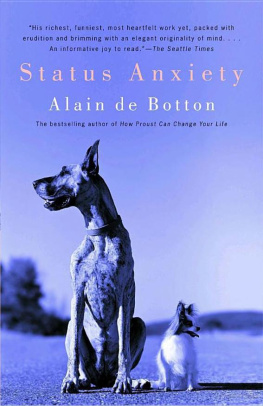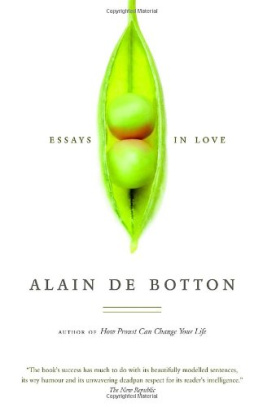Alain de Botton - The Art of Travel
Here you can read online Alain de Botton - The Art of Travel full text of the book (entire story) in english for free. Download pdf and epub, get meaning, cover and reviews about this ebook. publisher: Vintage, genre: Detective and thriller. Description of the work, (preface) as well as reviews are available. Best literature library LitArk.com created for fans of good reading and offers a wide selection of genres:
Romance novel
Science fiction
Adventure
Detective
Science
History
Home and family
Prose
Art
Politics
Computer
Non-fiction
Religion
Business
Children
Humor
Choose a favorite category and find really read worthwhile books. Enjoy immersion in the world of imagination, feel the emotions of the characters or learn something new for yourself, make an fascinating discovery.

- Book:The Art of Travel
- Author:
- Publisher:Vintage
- Genre:
- Rating:4 / 5
- Favourites:Add to favourites
- Your mark:
- 80
- 1
- 2
- 3
- 4
- 5
The Art of Travel: summary, description and annotation
We offer to read an annotation, description, summary or preface (depends on what the author of the book "The Art of Travel" wrote himself). If you haven't found the necessary information about the book — write in the comments, we will try to find it.
The Art of Travel — read online for free the complete book (whole text) full work
Below is the text of the book, divided by pages. System saving the place of the last page read, allows you to conveniently read the book "The Art of Travel" online for free, without having to search again every time where you left off. Put a bookmark, and you can go to the page where you finished reading at any time.
Font size:
Interval:
Bookmark:
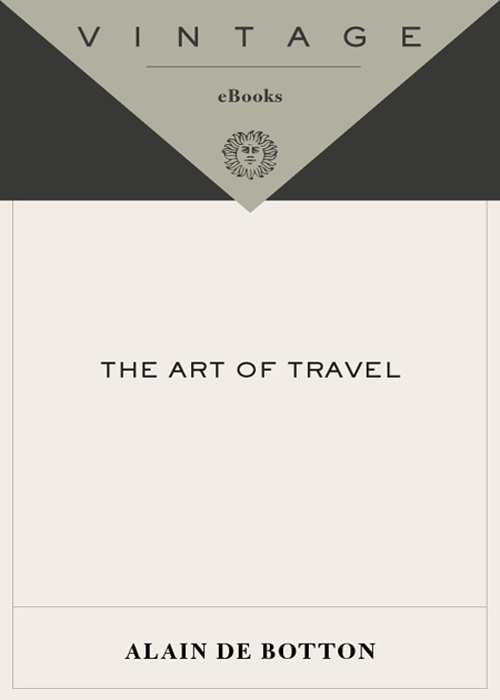
[Refreshing and profoundly readable. Thanks to de Botton's detailed and thoughtful writing, coupled with his clever curiosity, The Art of Travel hzs the potential to enrich not only our journeys, but also our lives.
The Philadelphia Inquirer
[De Botton] relates even the most disappointing experiences with delightful wit, graceful prose and surprising insight.
Los Angeles Times
Wickedly funny. De Botton travels like the rest of us, but he brings with him the amazing erudition, crisp, lovely prose, and entertaining intellect that made How Proust Can Change Your Life and The Consolations of Philosophy such phenomenal successes.
The Boston Globe
[Ejxudes erudition and artfulness. Delightful.
Minneapolis Star Tribune
[A] wonderful book: inventive, witty, intelligent, and beautifully written. At its best, its prose achieves the intensity of aphorism provocative and insightful teeming with tantalizing detail.
The Boston Phoenix
Charmingly and capably convinces us how unaware most of us are as we move about in the world will leave the reader mentally reaching for a pencil to check off the graceful, witty turns of Mr. De Botton's mind.
The Washington Times
A thoughtful and anecdote-rich meditation on how trips can alter us in unexpected ways.
Elle
An erudite, funny brand of philosophy will make you think and laugh and want to plan a trip to test out some of de Botton's ideas for yourself.
The Atlanta Journal-Constitution
[A] quirky, delightful meditation on why we go where we go. Read just a few pages of de Botton and you'll follow him any where.
0 Magazine
Quietly terrific. It says a great deal about his ability that no matter whom he might invoke he does not pale by comparison.
The New York Sun
De Botton gives voice and meaning to the thousands of epiphanies great and small brought about by voyaging.
Esquire
Alain de Botton piques curiosity not only about where we go but why and howquestions worth considering even if our destination is no farther than the nearest cabana.
Vogue
Journeys of the de Botton kind expand our perspective, they broaden our mind, they enrich the intellect. We travel, this precocious young man reminds us, to find ourselves.
The Dallas Morning News
Delicious writing pure, unalloyed pleasure. [De Botton's] thoughts are original, startling, and what is more, feel true.
The Arizona Republic
Utterly charming. De Botton notices the details, and as we grow accustomed to seeing the world through his eyes, perhaps we will notice more too. [A] fine writer.
The Times-Picayune
An elegant and subtle work, unlike any other. Beguiling.
The Times (London)
One of the very best contemporary travel writersan artist in the genre.
Jan Morris, The New Statesman
The Art of Travel
Alain de Botton is the author of On Love, The Romantic Movement, Kiss & Tell, How Proust Can Change Your Life, The Consolations of Philosophy, and, most recently, Status Anxiety. His work has been translated into twenty languages. He lives in London. More information can be found at www.alaindebotton.com.

On Love
The Romantic Movement
Kiss & Tell
How Proust Can Change Your Life
The Consolations of Philosophy
Status Anxiety
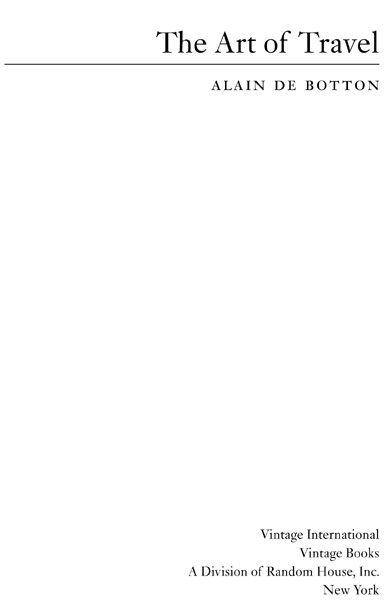
For Michele Hutchison
On Anticipation
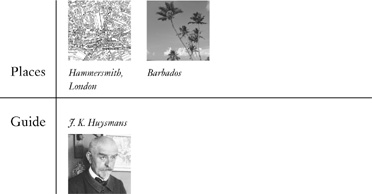
It was hard to say when exactly winter arrived. The decline was gradual, like that of a person into old age, inconspicuous from day to day until the season became an established, relentless reality. First came a dip in evening temperatures, then days of continuous rain, confused gusts of Atlantic wind, dampness, the fall of leaves and the changing of the clocksthough there were still occasional moments of reprieve, mornings when one could leave the house without a coat and the sky was cloudless and bright. But they were like false signs of recovery in a patient upon whom death has already passed its sentence. By December the new season was entrenched, and the city was covered almost every day by an ominous steel-grey sky, like one in a painting by Mantegna or Veronese, the perfect backdrop to the crucifixion of Christ or to a day beneath the bedclothes. The neighbourhood park became a desolate spread of mud and water, lit up at night by rain-streaked street lamps. Passing it one evening during a downpour, I recalled how, in the intense heat of the previous summer, I had stretched out on the ground and let my bare feet slip out of my shoes to caress the grass, and how this direct contact with the earth had brought with it a sense of freedom and expansiveness, summer breaking down the usual boundaries between indoors and out and allowing me to feel as much at home in the world as in my own bedroom.
But now the park was foreign once more, the grass a forbidding arena in the incessant rain. Any sadness I might have felt, any suspicion that happiness or understanding was unattainable, seemed to find ready encouragement in the sodden dark-red brick buildings and low skies tinged orange by the city's streetlights.
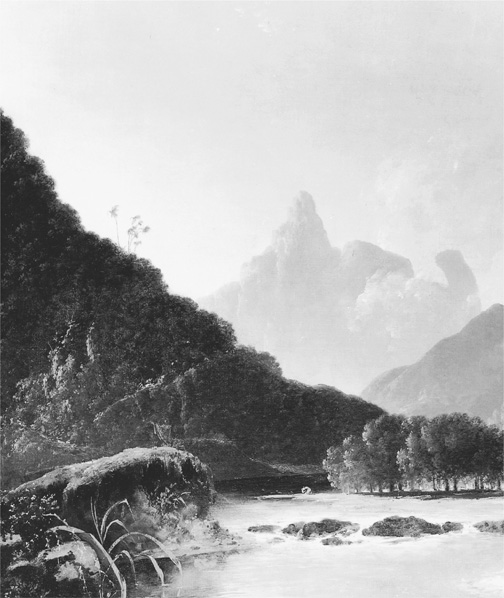
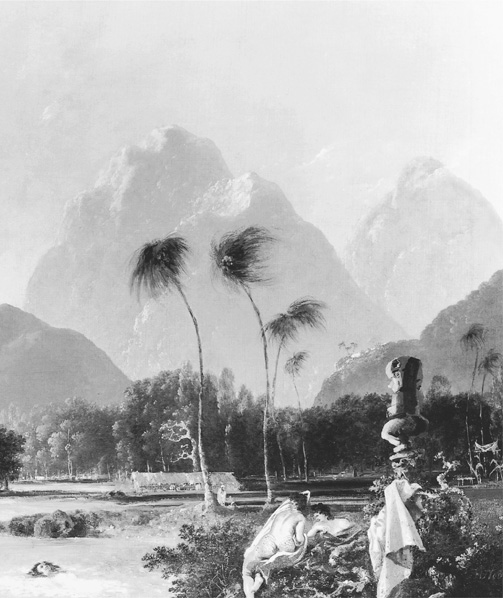
William Hodges, Tahiti Revisited, 1776
Such climatic circumstances, together with a sequence of events that occurred at around this time (and seemed to confirm Chamfort's dictum that a man must swallow a toad every morning to be sure of not meeting with anything more revolting in the day ahead), conspired to render me intensely susceptible to the unsolicited arrival one late afternoon of a large, brightly illustrated brochure entitled Winter Sun'. Its cover displayed a row of palm trees, many of them growing at an angle, on a sandy beach fringed by a turquoise sea, set against a backdrop of hills where I imagined there to be waterfalls and relief from the heat in the shade of sweet-smelling fruit trees. The photographs reminded me of the paintings of Tahiti that William Hodges had brought back from his journey with Captain Cook, showing a tropical lagoon in soft evening light, where smiling local girls cavorted carefree (and barefoot) through luxuriant foliageimages that had provoked wonder and longing when Hodges had first exhibited them at the Royal Academy in London in the sharp winter of 1776, and that continued to provide a model for subsequent depictions of tropical idylls, including those in the pages of Winter Sun'.
Font size:
Interval:
Bookmark:
Similar books «The Art of Travel»
Look at similar books to The Art of Travel. We have selected literature similar in name and meaning in the hope of providing readers with more options to find new, interesting, not yet read works.
Discussion, reviews of the book The Art of Travel and just readers' own opinions. Leave your comments, write what you think about the work, its meaning or the main characters. Specify what exactly you liked and what you didn't like, and why you think so.


